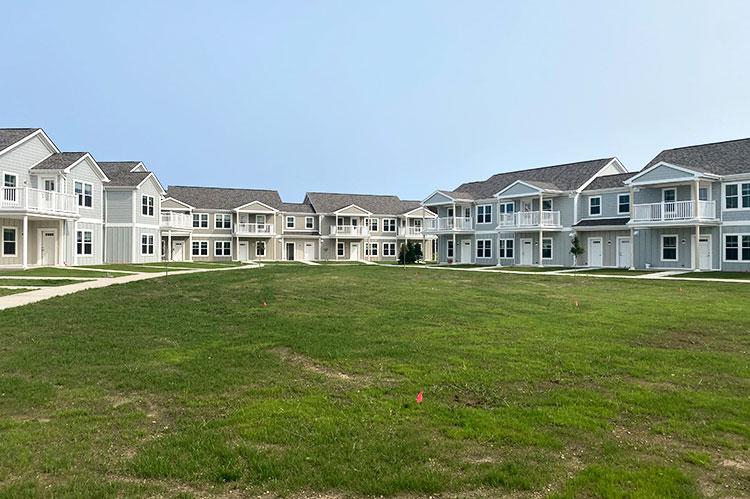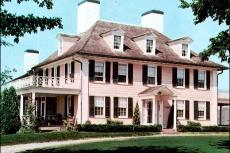Katy Casey, the executive director of the East Hampton Housing Authority, won acclaim from an initially dubious Amagansett Citizens Advisory Committee Monday night with an unambiguous, in-depth overview of the town’s affordable and work-force housing units; in particular its newest, the 37-unit Gansett Meadow.
Following the committee’s September meeting, which Ms. Casey was unable to attend, and the arrest of a Gansett Meadow resident on drug charges, members submitted numerous questions to her about the new complex. Is it full? Is there a waiting list? Is it really for locals? How many? Have there been any evictions? And dozens more.
She answered them all during an hour’s presentation.
Eighty-seven percent of Gansett Meadow residents “are from East Hampton’s five ZIP codes,” she said. Among them, as of Feb. 15, 2021, when the complex was declared fully occupied, are 58 people employed locally, by schools, grocery stores, restaurants, retail stores, medical centers, various trades, hotels, and golf clubs. In a printed handout, Ms. Casey broke down each category: “Groceries,” for example, includes employees of One Stop Market on Springs-Fireplace Road, the Amagansett I.G.A., Herb’s Market in Montauk, Stop and Shop in East Hampton (three people), and more.
There are no police officers on the list. One officer “was very close, but made just a little too much.”
Five affordable households are from outside the town, three of which, Ms. Casey said, “were eminently qualified and won the lottery.” They include people who are “retired, disabled, or unemployed,” a victim of domestic violence, and a formerly homeless person. Copies of the printout can be requested from her office at 316 Accabonac Road, East Hampton.
There are about 650 applicants on waiting lists as of now for the one-to-three-bedroom apartments, Ms. Casey told the committee. The affordable units are the most in demand, not surprisingly — those that rent at market rates, open to families or individuals making up to 90 percent of the area’s adjusted mean income, were among the last to be spoken for as of December 2020.
Among numerous questions as to their income, applicants are asked “how many jobs they work, do they sell things online, do they receive child support, what is their income tax.”
“Many are not required to pay income tax [if public assistance is your sole income, for example], but they must prove it,” Ms. Casey said. “There are only two deal-breakers: a certain level of sex offender, and anything involving methamphetamine.”
Applicants are also asked whether they’ve been arrested or convicted, which, she emphasized, are “two different things.” Several committee members had expressed concern last month over the arrest of a resident reported to be dealing drugs.
“How was that person allowed to have an apartment?” asked John Broderick.
“Nothing came up on the criminal check,” Ms. Casey replied. “The check did not reveal a conviction,” which, she said, “would mean eviction.” That case is not yet adjudicated, she noted, but in any event “that person no longer lives here.”
Asked what was her agency’s biggest challenge in creating housing, Ms. Casey did not hesitate: “Land.” A bill co-sponsored by Assemblyman Fred W. Thiele Jr., establishing a new half-percent real estate sales tax to fund affordable housing programs in the five East End towns and signed into law on Friday by Gov. Kathy Hochul, would be “a huge help,” she said. “In East Hampton Town, the fund would likely contribute $2 million to $3 million annually.”
Ms. Casey had made it clear at the start of her talk, however, that she works for the state, not the town. East Hampton Town “does not own or operate any rental properties,” she explained, though it does guarantee the money that enables the housing agency to buy the enabling bond. “It helps us to get a lower rate,” she said, adding that “we don’t do anything without talking to the town.”
She ended her presentation to a warm round of applause.
Also on Monday night’s agenda was an address by Susan Harder, well known here as the scourge of dark skies. Ms. Harder, an expert on outdoor lighting, had been invited to discuss Amagansett’s municipal parking lot, parts of which are too dark; other parts too glaringly bright. “We need uniformity,” Ms. Harder said. “Not too much light here and too little there
I don’t know if I’ve ever seen a parking lot that has such bad lighting.”
The town’s Parks Department oversees the lot, she said, “but it should be the Planning Department, which has people who understand the five principles of outdoor lighting.” Light should “have a clear purpose, be directed only to where needed, be no brighter than necessary, be controlled [used only when needed], and be limited to warmer colors, thus avoiding nighttime glare.” As an example of good lighting, she cited Amagansett Square, where glare is almost nonexistent.
Amagansett Main Street lighting is almost as bad as the parking lot’s, Ms. Harder said. “We cannot have lights above the trees; we need shorter poles, and more of them. We need to fix unshielded bulbs” — the Mobil station at Indian Wells Highway in particular has “illegal, superbright lights,” she said — and “insist the town pay for this.”
Ms. Harder concluded her talk by observing that “fireflies are diminishing. They can’t see each other to mate when the glare is so bad.” She urged the committee to ask the town board to hire a lighting designer — preferably to work with the Planning, rather than Parks, Department.




